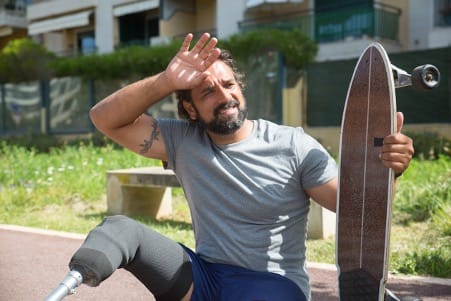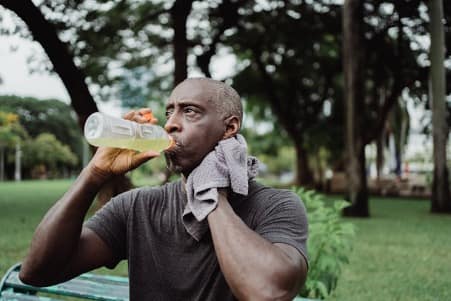The weather is getting warmer, and heat waves are happening more frequently. Everyone, including freelancers who provide a paper writing service, is considering ways to stay safe as the extreme heat doesn’t seem to be decreasing. However, certain widespread misconceptions about heat waves may confuse people.

Many misconceptions exist regarding heat exhaustion, heat waves, and dehydration when spending time outside in hot weather. Let us debunk those myths and ensure you do the right things to cool down quickly.
Not Sweating Means Your Body Has Cooled Down Enough
People often think they’re fine if they stop sweating, but that’s a big red flag. It indicates that your body may not have enough fluids to sweat, which is essential for cooling down. Sweat is necessary because it cools you down and evaporates, giving you the same pleasant feeling as a glass of lemonade.
You lose out on this essential cooling technique if you aren’t sweating. Whether you work at home or in an office, you need fluids to sweat and natural airflow to stay cool, not just air conditioning.
A Few Bottles of Beer Won’t Hurt
Drinking a few beers can be risky, especially in hot weather. Staying hydrated is already challenging, and adding alcohol makes it even tougher. Alcohol acts as a diuretic, which means it increases fluid loss from your body (the same goes for coffee, soda, and energy drinks). This is why you end up peeing more when you drink. In extreme heat, losing extra fluids can lead to dehydration. To stay properly hydrated, stick to non-alcoholic beverages during hot weather.
Tylenol Lowers Body Temperature
Contrary to popular belief, Tylenol does not reduce body temperature. Because Tylenol affects the area of your brain that regulates temperature, telling it to chill down can help lower fever caused by infections.
Heatstroke, on the other hand, is simply your body overheating from too much heat; no infection or brain reset is involved. Tylenol will not alleviate heatstroke in any way. It can also be more difficult to control body temperature when taking certain medications such as beta blockers and diuretics. So, don’t rely on medications to lower body temperature caused by infections and cool down during an intense heat wave.
Sleeping Naked Helps You Remain Cool
Although it may seem like a good idea to sleep naked during a heat wave, doing so can actually make it more difficult to fall asleep. Sweat might accumulate on your skin without pajamas, making you feel hotter. Changing to breathable, light pajamas will keep you cooler and more comfortable all night. Your body temperature will decrease while you sleep, even in extremely hot conditions. Therefore, choosing the appropriate pajamas is essential for a restful night’s sleep.

Cooling the Face First Is the Best
If someone offers you a fan while you’re feeling hot, your natural reaction could be to point it to the face and neck. However, this is not the most effective method for reducing body temperature. Even if the breeze feels good on your face, it doesn’t actually cool you off.
Dousing both hands in cold water for around twenty minutes is a more effective approach. Chilling your hands will help lower your body heat more effectively than just fanning your face because your hands receive a lot of blood flow. Remember, feeling cooler isn’t the same as actually cooling down.
Hydration Cures Heat Stroke
Drinking fluids might not be enough to save you from heat stroke. People often think drinking plenty of water is enough, but if you feel dizzy, have muscle cramps, or are sweating a lot, it can be a sign that your body is in trouble.
Even if your temperature seems normal, these symptoms mean it’s time to get out of the sun and cool off. Ignoring these signs can lead to disorientation and rapidly rising temperatures, causing an emergency. In short, hydrating alone can’t cure heat stroke, especially when it becomes threatening.
Yes, you must always stay hydrated, but drinking excess water can cause hyponatremia. Drink water regularly throughout the day to avoid this, and if you sweat a lot, take beverages with electrolytes.
Take a Cold Shower
While taking a cold shower on a hot day is tempting, it’s not the best way to cool your body during a heat wave. While submerging a single body part in cold water can be beneficial, doing so will hinder your body’s ability to cool down because it will cause your body to constrict blood flow to the skin and prevent heat release.
This will make you colder without actually cooling down. Try taking a lukewarm shower instead of a cold one. Water that feels comfortably warm has a cooling effect and promotes healthy skin blood flow more effectively.
Heatstroke and Heat Exhaustion Are the Same Thing
Heat exhaustion functions as your body’s alarm. It’s a warning sign that you’re feeling ill from too much heat, so stop what you’re doing, get out of the heat, and drink some water. Although it indicates your body is having trouble with the heat, it is not yet harmful. Without confusion, the symptoms are similar to those of the flu, including headaches, nausea, and occasionally vomiting.
If you recognize heat exhaustion early and take action, you can prevent it from escalating into heatstroke, which is a serious medical emergency.
Don’t Drink Anything Hot
Many people believe that the best method to cool quickly during a heat wave is to stick to cold liquids and stay away from anything hot. Even though it could provide some short-term comfort, chilled beverages don’t help you stay cool over time. Surprisingly, drinking anything warm can speed up the cooling effect. This is because it triggers the body’s cooling systems, including perspiration and more skin circulation. Ice-cold water doesn’t majorly affect your internal temperature; on the other hand, drinking hot fluids helps your body regulate heat better. Nonetheless, avoid hot beverages that are alcoholic or caffeine-infused, as these can raise body temperature and
Advertise with the mоѕt vіѕіtеd nеwѕ ѕіtе іn Antigua!
We offer fully customizable and flexible digital marketing packages.
Contact us at [email protected]
















